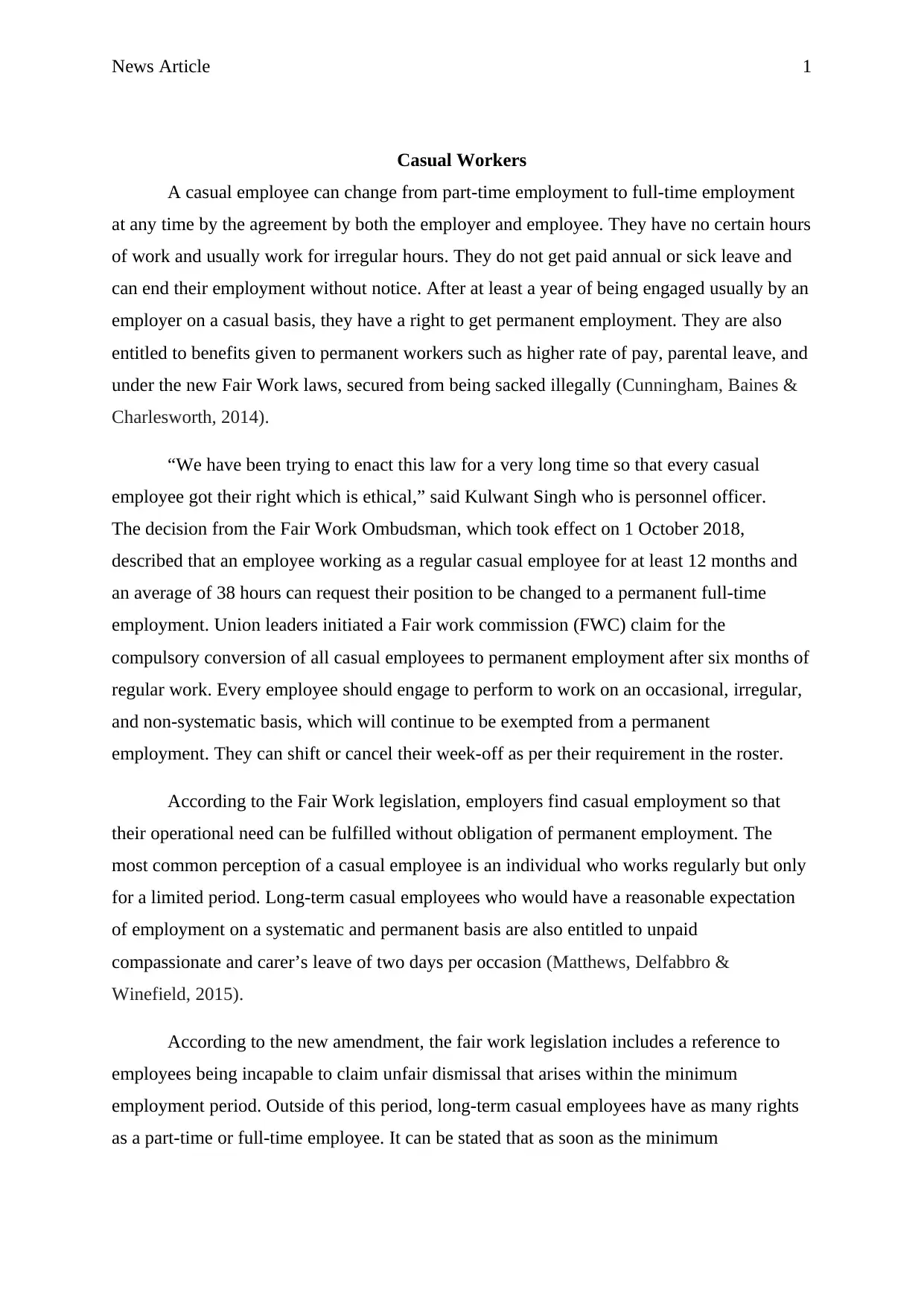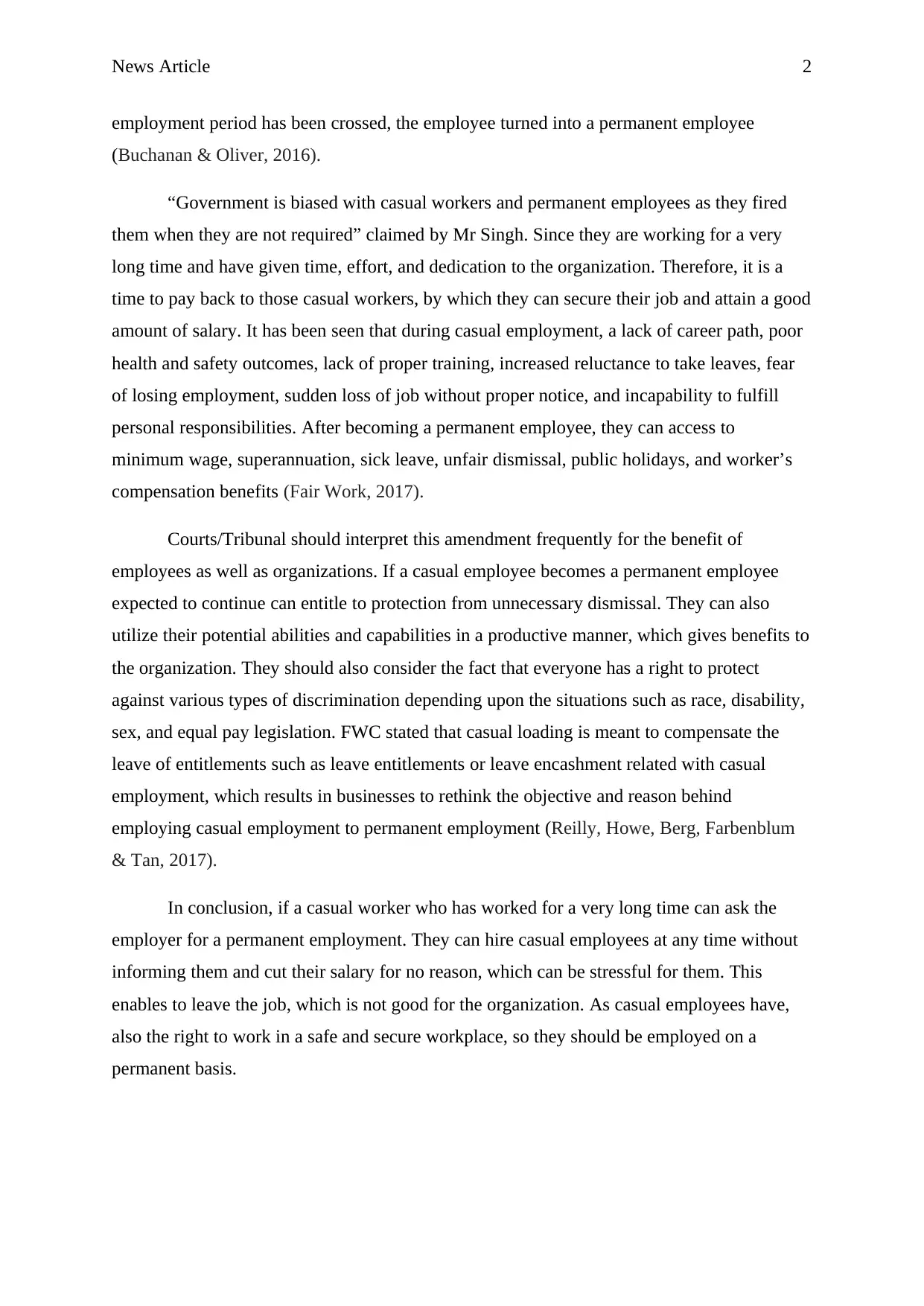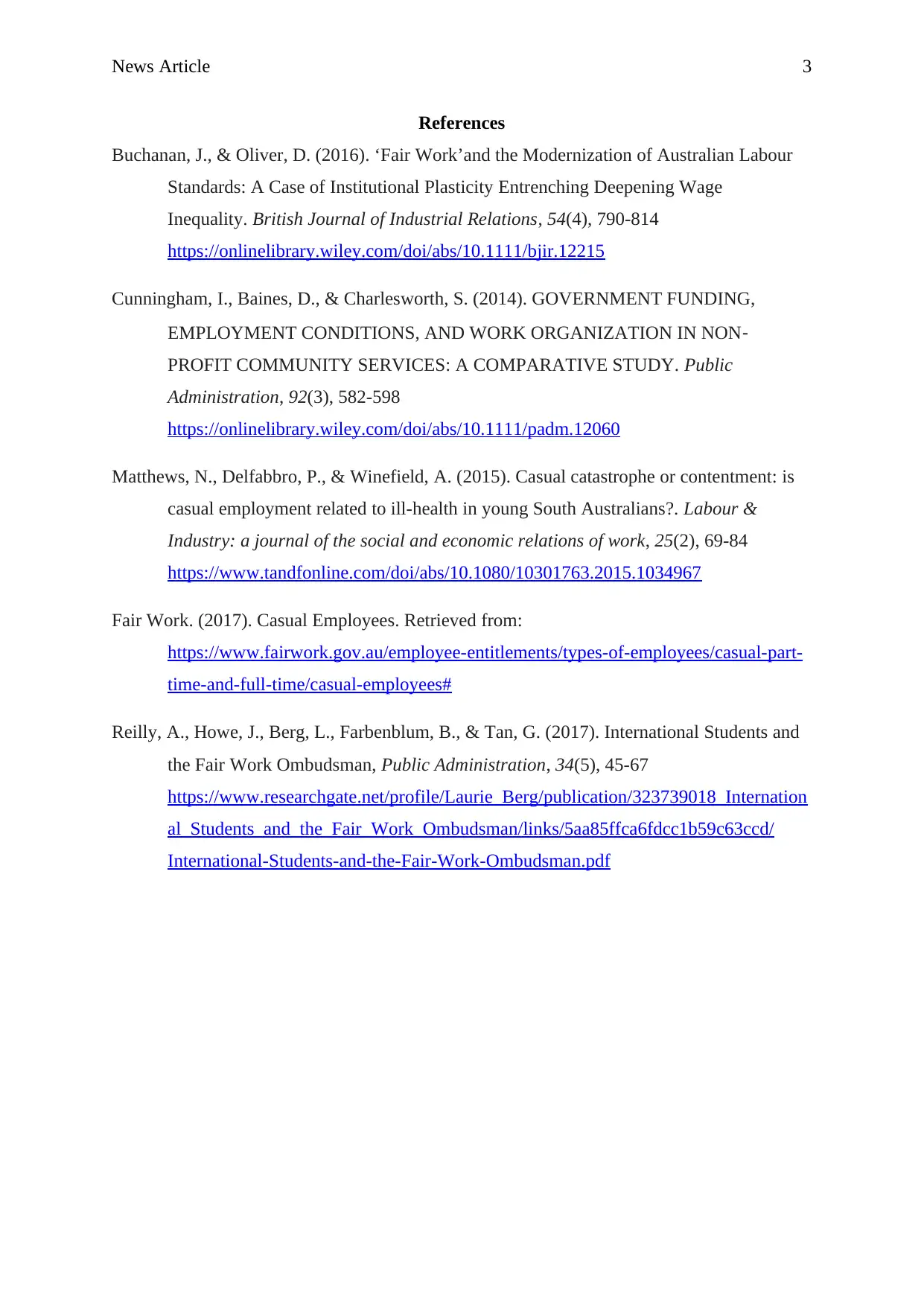Investigation: Casual Workers' Rights Under Fair Work Legislation
VerifiedAdded on 2023/06/04
|4
|1091
|425
Report
AI Summary
This report provides a detailed analysis of a news article focused on the rights and regulations concerning casual workers. The article explores the transition from casual to permanent employment, emphasizing the Fair Work legislation's role in protecting casual employees. It discusses the entitlements of casual workers, including the potential for conversion to permanent positions after consistent employment, and protections against unfair dismissal. The article highlights the benefits of permanent employment, such as access to minimum wage, superannuation, and various leave entitlements. It also addresses the perspectives of both employers and employees, including the impact of casual employment on career paths and working conditions. The report references key legal decisions and expert opinions to provide a comprehensive overview of the topic.

Running Head: News Article 0
News Article
News Article
Paraphrase This Document
Need a fresh take? Get an instant paraphrase of this document with our AI Paraphraser

News Article 1
Casual Workers
A casual employee can change from part-time employment to full-time employment
at any time by the agreement by both the employer and employee. They have no certain hours
of work and usually work for irregular hours. They do not get paid annual or sick leave and
can end their employment without notice. After at least a year of being engaged usually by an
employer on a casual basis, they have a right to get permanent employment. They are also
entitled to benefits given to permanent workers such as higher rate of pay, parental leave, and
under the new Fair Work laws, secured from being sacked illegally (Cunningham, Baines &
Charlesworth, 2014).
“We have been trying to enact this law for a very long time so that every casual
employee got their right which is ethical,” said Kulwant Singh who is personnel officer.
The decision from the Fair Work Ombudsman, which took effect on 1 October 2018,
described that an employee working as a regular casual employee for at least 12 months and
an average of 38 hours can request their position to be changed to a permanent full-time
employment. Union leaders initiated a Fair work commission (FWC) claim for the
compulsory conversion of all casual employees to permanent employment after six months of
regular work. Every employee should engage to perform to work on an occasional, irregular,
and non-systematic basis, which will continue to be exempted from a permanent
employment. They can shift or cancel their week-off as per their requirement in the roster.
According to the Fair Work legislation, employers find casual employment so that
their operational need can be fulfilled without obligation of permanent employment. The
most common perception of a casual employee is an individual who works regularly but only
for a limited period. Long-term casual employees who would have a reasonable expectation
of employment on a systematic and permanent basis are also entitled to unpaid
compassionate and carer’s leave of two days per occasion (Matthews, Delfabbro &
Winefield, 2015).
According to the new amendment, the fair work legislation includes a reference to
employees being incapable to claim unfair dismissal that arises within the minimum
employment period. Outside of this period, long-term casual employees have as many rights
as a part-time or full-time employee. It can be stated that as soon as the minimum
Casual Workers
A casual employee can change from part-time employment to full-time employment
at any time by the agreement by both the employer and employee. They have no certain hours
of work and usually work for irregular hours. They do not get paid annual or sick leave and
can end their employment without notice. After at least a year of being engaged usually by an
employer on a casual basis, they have a right to get permanent employment. They are also
entitled to benefits given to permanent workers such as higher rate of pay, parental leave, and
under the new Fair Work laws, secured from being sacked illegally (Cunningham, Baines &
Charlesworth, 2014).
“We have been trying to enact this law for a very long time so that every casual
employee got their right which is ethical,” said Kulwant Singh who is personnel officer.
The decision from the Fair Work Ombudsman, which took effect on 1 October 2018,
described that an employee working as a regular casual employee for at least 12 months and
an average of 38 hours can request their position to be changed to a permanent full-time
employment. Union leaders initiated a Fair work commission (FWC) claim for the
compulsory conversion of all casual employees to permanent employment after six months of
regular work. Every employee should engage to perform to work on an occasional, irregular,
and non-systematic basis, which will continue to be exempted from a permanent
employment. They can shift or cancel their week-off as per their requirement in the roster.
According to the Fair Work legislation, employers find casual employment so that
their operational need can be fulfilled without obligation of permanent employment. The
most common perception of a casual employee is an individual who works regularly but only
for a limited period. Long-term casual employees who would have a reasonable expectation
of employment on a systematic and permanent basis are also entitled to unpaid
compassionate and carer’s leave of two days per occasion (Matthews, Delfabbro &
Winefield, 2015).
According to the new amendment, the fair work legislation includes a reference to
employees being incapable to claim unfair dismissal that arises within the minimum
employment period. Outside of this period, long-term casual employees have as many rights
as a part-time or full-time employee. It can be stated that as soon as the minimum

News Article 2
employment period has been crossed, the employee turned into a permanent employee
(Buchanan & Oliver, 2016).
“Government is biased with casual workers and permanent employees as they fired
them when they are not required” claimed by Mr Singh. Since they are working for a very
long time and have given time, effort, and dedication to the organization. Therefore, it is a
time to pay back to those casual workers, by which they can secure their job and attain a good
amount of salary. It has been seen that during casual employment, a lack of career path, poor
health and safety outcomes, lack of proper training, increased reluctance to take leaves, fear
of losing employment, sudden loss of job without proper notice, and incapability to fulfill
personal responsibilities. After becoming a permanent employee, they can access to
minimum wage, superannuation, sick leave, unfair dismissal, public holidays, and worker’s
compensation benefits (Fair Work, 2017).
Courts/Tribunal should interpret this amendment frequently for the benefit of
employees as well as organizations. If a casual employee becomes a permanent employee
expected to continue can entitle to protection from unnecessary dismissal. They can also
utilize their potential abilities and capabilities in a productive manner, which gives benefits to
the organization. They should also consider the fact that everyone has a right to protect
against various types of discrimination depending upon the situations such as race, disability,
sex, and equal pay legislation. FWC stated that casual loading is meant to compensate the
leave of entitlements such as leave entitlements or leave encashment related with casual
employment, which results in businesses to rethink the objective and reason behind
employing casual employment to permanent employment (Reilly, Howe, Berg, Farbenblum
& Tan, 2017).
In conclusion, if a casual worker who has worked for a very long time can ask the
employer for a permanent employment. They can hire casual employees at any time without
informing them and cut their salary for no reason, which can be stressful for them. This
enables to leave the job, which is not good for the organization. As casual employees have,
also the right to work in a safe and secure workplace, so they should be employed on a
permanent basis.
employment period has been crossed, the employee turned into a permanent employee
(Buchanan & Oliver, 2016).
“Government is biased with casual workers and permanent employees as they fired
them when they are not required” claimed by Mr Singh. Since they are working for a very
long time and have given time, effort, and dedication to the organization. Therefore, it is a
time to pay back to those casual workers, by which they can secure their job and attain a good
amount of salary. It has been seen that during casual employment, a lack of career path, poor
health and safety outcomes, lack of proper training, increased reluctance to take leaves, fear
of losing employment, sudden loss of job without proper notice, and incapability to fulfill
personal responsibilities. After becoming a permanent employee, they can access to
minimum wage, superannuation, sick leave, unfair dismissal, public holidays, and worker’s
compensation benefits (Fair Work, 2017).
Courts/Tribunal should interpret this amendment frequently for the benefit of
employees as well as organizations. If a casual employee becomes a permanent employee
expected to continue can entitle to protection from unnecessary dismissal. They can also
utilize their potential abilities and capabilities in a productive manner, which gives benefits to
the organization. They should also consider the fact that everyone has a right to protect
against various types of discrimination depending upon the situations such as race, disability,
sex, and equal pay legislation. FWC stated that casual loading is meant to compensate the
leave of entitlements such as leave entitlements or leave encashment related with casual
employment, which results in businesses to rethink the objective and reason behind
employing casual employment to permanent employment (Reilly, Howe, Berg, Farbenblum
& Tan, 2017).
In conclusion, if a casual worker who has worked for a very long time can ask the
employer for a permanent employment. They can hire casual employees at any time without
informing them and cut their salary for no reason, which can be stressful for them. This
enables to leave the job, which is not good for the organization. As casual employees have,
also the right to work in a safe and secure workplace, so they should be employed on a
permanent basis.
⊘ This is a preview!⊘
Do you want full access?
Subscribe today to unlock all pages.

Trusted by 1+ million students worldwide

News Article 3
References
Buchanan, J., & Oliver, D. (2016). ‘Fair Work’and the Modernization of Australian Labour
Standards: A Case of Institutional Plasticity Entrenching Deepening Wage
Inequality. British Journal of Industrial Relations, 54(4), 790-814
https://onlinelibrary.wiley.com/doi/abs/10.1111/bjir.12215
Cunningham, I., Baines, D., & Charlesworth, S. (2014). GOVERNMENT FUNDING,
EMPLOYMENT CONDITIONS, AND WORK ORGANIZATION IN NON‐
PROFIT COMMUNITY SERVICES: A COMPARATIVE STUDY. Public
Administration, 92(3), 582-598
https://onlinelibrary.wiley.com/doi/abs/10.1111/padm.12060
Matthews, N., Delfabbro, P., & Winefield, A. (2015). Casual catastrophe or contentment: is
casual employment related to ill-health in young South Australians?. Labour &
Industry: a journal of the social and economic relations of work, 25(2), 69-84
https://www.tandfonline.com/doi/abs/10.1080/10301763.2015.1034967
Fair Work. (2017). Casual Employees. Retrieved from:
https://www.fairwork.gov.au/employee-entitlements/types-of-employees/casual-part-
time-and-full-time/casual-employees#
Reilly, A., Howe, J., Berg, L., Farbenblum, B., & Tan, G. (2017). International Students and
the Fair Work Ombudsman, Public Administration, 34(5), 45-67
https://www.researchgate.net/profile/Laurie_Berg/publication/323739018_Internation
al_Students_and_the_Fair_Work_Ombudsman/links/5aa85ffca6fdcc1b59c63ccd/
International-Students-and-the-Fair-Work-Ombudsman.pdf
References
Buchanan, J., & Oliver, D. (2016). ‘Fair Work’and the Modernization of Australian Labour
Standards: A Case of Institutional Plasticity Entrenching Deepening Wage
Inequality. British Journal of Industrial Relations, 54(4), 790-814
https://onlinelibrary.wiley.com/doi/abs/10.1111/bjir.12215
Cunningham, I., Baines, D., & Charlesworth, S. (2014). GOVERNMENT FUNDING,
EMPLOYMENT CONDITIONS, AND WORK ORGANIZATION IN NON‐
PROFIT COMMUNITY SERVICES: A COMPARATIVE STUDY. Public
Administration, 92(3), 582-598
https://onlinelibrary.wiley.com/doi/abs/10.1111/padm.12060
Matthews, N., Delfabbro, P., & Winefield, A. (2015). Casual catastrophe or contentment: is
casual employment related to ill-health in young South Australians?. Labour &
Industry: a journal of the social and economic relations of work, 25(2), 69-84
https://www.tandfonline.com/doi/abs/10.1080/10301763.2015.1034967
Fair Work. (2017). Casual Employees. Retrieved from:
https://www.fairwork.gov.au/employee-entitlements/types-of-employees/casual-part-
time-and-full-time/casual-employees#
Reilly, A., Howe, J., Berg, L., Farbenblum, B., & Tan, G. (2017). International Students and
the Fair Work Ombudsman, Public Administration, 34(5), 45-67
https://www.researchgate.net/profile/Laurie_Berg/publication/323739018_Internation
al_Students_and_the_Fair_Work_Ombudsman/links/5aa85ffca6fdcc1b59c63ccd/
International-Students-and-the-Fair-Work-Ombudsman.pdf
1 out of 4
Related Documents
Your All-in-One AI-Powered Toolkit for Academic Success.
+13062052269
info@desklib.com
Available 24*7 on WhatsApp / Email
![[object Object]](/_next/static/media/star-bottom.7253800d.svg)
Unlock your academic potential
Copyright © 2020–2026 A2Z Services. All Rights Reserved. Developed and managed by ZUCOL.



